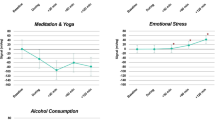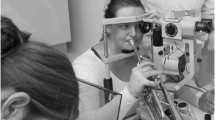Abstract
Background
We investigated the effects on intraocular pressure (IOP) and blood pressure (BP) of playing brass and woodwind instruments by monitoring IOP and BP in a representative group of professional musicians under a variety of common playing conditions.
Methods
IOP and BP measurements were recorded from 37 brass and 15 woodwind instrument players, before and after playing tones of low, middle and high frequency. We also measured IOP and BP before and during playing common exercises of 10 minutes duration, as well as after playing a sustained high-pitched tone, to test for changes in IOP under conditions of maximum effort.
Results
Playing tones on brass and woodwind instruments causes a temporary elevation in IOP and BP, depending on the tone frequency: brass instrument players showed a significant elevation after playing high and middle frequency tones (p < 0.0001) whereas woodwind instrument players showed a significant increase only for high frequencies (e.g., oboe, 17 ± 2.9 mm Hg to 21 ± 4.4 mm Hg; p = 0.017). Playing a typical exercise of 10 minutes temporarily increased IOP in both groups of musicians. Finally, playing a sustained tone of high pitch caused a significant elevation in IOP in brass instrument players only (16.6 ± 3.5 mm Hg to 23.3 ± 8.9 mm Hg; p < 0.0001).
Conclusions
The temporary and sometimes dramatic elevations and fluctuations in IOP observed in this study, coupled with daily exposure to instrument play, puts professional wind instrument players at increased risk of developing glaucoma. Consequently, these musicians should be monitored for signs of glaucoma, especially those with co-existing risk factors.



Similar content being viewed by others
References
Pizzarello L, Abiose A, Ffytche T, Duerksen R, Thulasiraj R, Taylor H, Faal H, Rao G, Kocur I, Resnikoff S (2004) VISION 2020: The Right to Sight: a global initiative to eliminate avoidable blindness. Arch Ophthalmol 122:615–620
Sultan MB, Mansberger SL, Lee PP (2009) Understanding the importance of IOP variables in glaucoma: a systematic review. Surv Ophthalmol 54:643–662
Nassr MA, Morris CL, Netland PA, Karcioglu ZA (2009) Intraocular pressure change in orbital disease. Surv Ophthalmol 54:519–544
Morrison JC, Nylander KB, Lauer AK, Cepurna WO, Johnson E (1998) Glaucoma drops control intraocular pressure and protect optic nerves in a rat model of glaucoma. Invest Ophthalmol Vis Sci 39:526–531
Heijl A, Leske MC, Bengtsson B, Hyman L, Hussein M (2002) Reduction of intraocular pressure and glaucoma progression: results from the Early Manifest Glaucoma Trial. Arch Ophthalmol 120:1268–1279
Kass MA, Heuer DK, Higginbotham EJ, Johnson CA, Keltner JL, Miller JP, Parrish RK 2nd, Wilson MR, Gordon MO (2002) The Ocular Hypertension Treatment Study: a randomized trial determines that topical ocular hypotensive medication delays or prevents the onset of primary open-angle glaucoma. Arch Ophthalmol 120:701–713, discussion 829-730
Leske MC, Heijl A, Hussein M, Bengtsson B, Hyman L, Komaroff E (2003) Factors for glaucoma progression and the effect of treatment: the early manifest glaucoma trial. Arch Ophthalmol 121:48–56
Johnson EC, Cepurna WO, Jia L, Morrison JC (2006) The use of cyclodialysis to limit exposure to elevated intraocular pressure in rat glaucoma models. Exp Eye Res 83:51–60
Nickells RW (2007) From ocular hypertension to ganglion cell death: a theoretical sequence of events leading to glaucoma. Can J Ophthalmol 42:278–287
Nickells RW, Schlamp CL, Li Y, Kaufman PL, Heatley G, Peterson JC, Faha B, Ver Hoeve JN (2007) Surgical lowering of elevated intraocular pressure in monkeys prevents progression of glaucomatous disease. Exp Eye Res 84:729–736
Leske MC, Warheit-Roberts L, Wu SY (1996) Open-angle glaucoma and ocular hypertension: the Long Island Glaucoma Case-control Study. Ophthalmic Epidemiol 3:85–96
Bulpitt CJ, Hodes C, Everitt MG (1975) Intraocular pressure and systemic blood pressure in the elderly. Br J Ophthalmol 59:717–720
Klein BE, Klein R (1981) Intraocular pressure and cardiovascular risk variables. Arch Ophthalmol 99:837–839
Klein BE, Klein R, Knudtson MD (2005) Intraocular pressure and systemic blood pressure: longitudinal perspective: the Beaver Dam Eye Study. Br J Ophthalmol 89:284–287
Bouhuys A (1964) Lung volumes and breathing patterns in wind-instrument players. J Appl Physiol 19:967–975
Fiz JA, Aguilar J, Carreras A, Teixido A, Haro M, Rodenstein DO, Morera J (1993) Maximum respiratory pressures in trumpet players. Chest 104:1203–1204
Schorr-Lesnick B, Teirstein AS, Brown LK, Miller A (1985) Pulmonary function in singers and wind-instrument players. Chest 88:201–205
Herer B (2001) Music and respiratory pathology. Rev Mal Respir 18:115–122
Borgia JF, Horvath SM, Dunn FR, von Phul PV, Nizet PM (1975) Some physiological observations on French horn musicians. J Occup Med 17:696–701
Dimsdale JE, Nelesen RA (1995) French-horn hypertension. N Engl J Med 333:326–327
Faulkner M, Sharpey-Schafer EP (1959) Circulatory effects of trumpet playing. Br Med J 1:685–686
Harris LR (1996) Horn playing and blood pressure. Lancet 348:1042
Larger E, Ledoux S (1996) Cardiovascular effects of French horn playing. Lancet 348:1528
Elghozi JL, Girard A, Fritsch P, Laude D, Petitprez JL (2008) Tuba players reproduce a Valsalva maneuver while playing high notes. Clin Auton Res 18:96–104
Rosen DA, Johnston VC (1959) Ocular pressure patterns in the Valsalva maneuver. Arch Ophthalmol 62:810–816
Schuman JS, Massicotte EC, Connolly S, Hertzmark E, Mukherji B, Kunen MZ (2000) Increased intraocular pressure and visual field defects in high resistance wind instrument players. Ophthalmology 107:127–133
Abraham AG, Condon NG, West Gower E (2006) The new epidemiology of cataract. Ophthalmol Clin North Am 19:415–425
Thornton J, Edwards R, Mitchell P, Harrison RA, Buchan I, Kelly SP (2005) Smoking and age-related macular degeneration: a review of association. Eye (Lond) 19:935–944
Lee AJ, Rochtchina E, Wang JJ, Healey PR, Mitchell P (2003) Does smoking affect intraocular pressure? Findings from the Blue Mountains Eye Study. J Glaucoma 12:209–212
Morgan RW, Drance SM (1975) Chronic open-angle glaucoma and ocular hypertension. An epidemiological study. Br J Ophthalmol 59:211–215
Reynolds DC (1977) Relative risk factors in chronic open-angle glaucoma: an epidemiological study. Am J Optom Physiol Opt 54:116–120
Wilson MR, Hertzmark E, Walker AM, Childs-Shaw K, Epstein DL (1987) A case-control study of risk factors in open angle glaucoma. Arch Ophthalmol 105:1066–1071
Katz J, Sommer A (1988) Risk factors for primary open angle glaucoma. Am J Prev Med 4:110–114
Klein BE, Klein R, Ritter LL (1993) Relationship of drinking alcohol and smoking to prevalence of open-angle glaucoma. The Beaver Dam Eye Study. Ophthalmology 100:1609–1613
Quigley HA, Enger C, Katz J, Sommer A, Scott R, Gilbert D (1994) Risk factors for the development of glaucomatous visual field loss in ocular hypertension. Arch Ophthalmol 112:644–649
Stewart WC, Crinkley CM, Murrell HP (1994) Cigarette-smoking in normal subjects, ocular hypertensive, and chronic open-angle glaucoma patients. Am J Ophthalmol 117:267–268
Kang JH, Pasquale LR, Rosner BA, Willett WC, Egan KM, Faberowski N, Hankinson SE (2003) Prospective study of cigarette smoking and the risk of primary open-angle glaucoma. Arch Ophthalmol 121:1762–1768
Grewal RK, Karalekas DP, Kraff C, Hawkinson DW, Krupin T (1995) Intraocular pressure change with increased pulmonary outflow. Investig Ophthalmol Vis Sci 36:295–387
Schwab B, Schultze-Florey A (2004) Investigations into intraoral pressure in woodwind and brass musicians. Musikerphysiologie und Musikermedizin 11:183–194
Acknowledgement
We would like to thank Graeme Kennedy for helpful comments on the manuscript. Results of this paper were partly presented at the International Congress on Music Physiology and Musician Medicine 2009 (Freiburg, Germany).
Author information
Authors and Affiliations
Corresponding author
Rights and permissions
About this article
Cite this article
Schmidtmann, G., Jahnke, S., Seidel, E.J. et al. Intraocular pressure fluctuations in professional brass and woodwind musicians during common playing conditions. Graefes Arch Clin Exp Ophthalmol 249, 895–901 (2011). https://doi.org/10.1007/s00417-010-1600-x
Received:
Revised:
Accepted:
Published:
Issue Date:
DOI: https://doi.org/10.1007/s00417-010-1600-x





